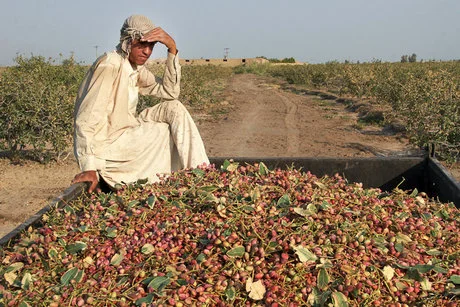The unknown future of pistachio gardening: Has Kerman lost the quality of pistachio production?
According to Citrono, quoted from Farday Kerman, Seyed Mahmoud Abtahi, a veteran activist of the pistachio industry and the chairman of the board of trustees of the Pistachio Association, regarding the future of garden planting, while explaining the reasons that affect the price of pistachios in dollars and rials, he stated that until the cost of the dollar stabilizes, the future of garden planting It will be unknown.
Stating that the pistachio market is a “perfect competition market,” he said: “In this market, no one determines the price, but it is determined based on supply and demand, and this price is the guide for when to sell pistachios when Buy or when to go to the production and development of the garden.
Emphasizing that the price is the market's regulator, he explained that the essence and essence of pistachio is the cost of production factors that Iran's pistachio has alternative products such as American pistachio. The price of alternative outcomes of pistachio, including walnuts and especially cashews, depends on the price. Pistachios have an effect.
Abtahi added: “But these factors do not change much in the medium and short term; For this reason, the price of pistachios does not fluctuate much in the world markets.
He continued: “The factor that affects the price of pistachio riyals is the expectation of the future and what you as a buyer and seller expect from the future, and this greatly determines the price. For this reason, and since our pistachios are exported, and many fluctuations and changes accompany the dollar price, we have seen a great impact on the Rial price of pistachios, so that in 2021 and 2022, pistachios cost 200 thousand tomans and 300 thousand tomans per kilo. It has been sold.”
Trying to introduce the new pole of Iranian pistachio in Azerbaijan, Iran
Ilkhchi in East Azarbaijan has a 200-year history of pistachio planting. In recent years, Ilkhchi farmers have spontaneously changed the cultivation pattern to pistachio. Scientific and practical support is needed in order not to discourage them from changing the cultivation pattern. To preserve the pistachio orchards.
At the meeting of the Agriculture Commission of Tabriz Chamber of Commerce, Qasim Qavidel pointed out that Ilkhchi was becoming a pole of pistachio and added: Pistachio can be cultivated in different parts of the country and efforts should be made by changing the cultivation pattern in the area of Lake Urmia, which is prone to cultivation of this product. To strengthen the production of this strategic and profitable product.
The head of the Agriculture Commission of the Tabriz Chamber of Commerce emphasized the need to provide the requirements and prerequisites for changing the cultivation pattern, including providing the necessary training and giving government subsidies in cases where it takes time to change the cultivation pattern and productivity and profitability of the product.
He said: Today, Kerman province has lost the quality of pistachios, which is due to lack of water, soil pollution, and old trees, and Iran's pistachios, which have a high foreign exchange rate and represent Iran in the world, are facing the threat of production, and alternative areas should be found for Choose to plant it.
Kerman dates and pistachios are exported to 41 countries
These statements were made while the Director General of Kerman Standards announced the issuance of 2,861 export conformity certificates for pistachio, pistachio kernels, dates, and date products of this province during nine months of this year and said. These products were exported to 41 countries in the world.
In an interview with IRNA reporter on Friday, Ismail Aqili added: This General Administration has taken action regarding the inspection and sampling of export shipments subject to standard regulations in Kerman province after sampling 2,861 shipments and checking and testing. Finally, the same amount of conformity certificate for export goods was issued.
He said: These products of Kerman province include pistachios, pistachio nuts, dates, and dates to the countries of Jordan, Armenia, Uzbekistan, Spain, Australia, Estonia, Ukraine, Germany, United Arab Emirates, Saudi Arabia, Indonesia, Italy, Bahrain, Belarus. , Belgium, Pakistan, Taiwan, Turkey, China, Russia, Romania, Czech Republic, Japan, Singapore, Sweden, Switzerland, Serbia, Iraq, France, Kyrgyzstan, Kazakhstan, Qatar, Canada, Georgia, Lebanon, Malaysia, Egypt, Netherlands, It has been exported to India, Hong Kong and Greece.
Failure to provide sufficient bank facilities for pistachio farmers
Hossein Firouzi, the governor of Esko city, pointing out that pistachio orchards have been built on a thousand hectares of Ilkhchi district, 700 hectares of which are fertile and 300 hectares of which are infertile, said: the lack of sufficient bank facilities for pistachio farmers due to their delay for several years. The problems of this field include the fruiting of trees, the problem of particular pistachio pests, the high price and low quality of fertilizers and pesticides, and the issue of paying attention to the security of gardens and permits for the construction of garden houses.
He continued: Planting this product is developing due to its added value and price, and there is a desire for more production. Since Azerbaijan is the cradle of dry fruit trade, we expect help from the Chamber of Commerce in product processing, marketing, and sales.
The necessity of serious government support to farmers in changing the cultivation pattern
Jalal Haqshanas from the farmers of Ilkhchi district, pointing out that the farmers of the region have warned about the lack of water and the need to change the cultivation pattern since two decades ago, he demanded the government's serious support to the farmers in changing the cultivation pattern, especially in pistachio, because with the change Cultivation pattern from onion to pistachio crop, the farmer must wait seven years for the pistachio trees to bear fruit.
He demanded the issuance of a license for the construction of a garden house, the acceleration of the completion of the drip irrigation plan of 1,400 farmers in the region, and the issuance of a branch license by the companies providing services to the agricultural lands of Ilkhchi.
Yusuf Ghafarzadeh, CEO of the regional water company of the province, pointed out that in 22 out of 24 plains of the region, we are facing a drop in the level of underground water from 20 to 80 cm. Having these sources, we must continue the decline of the underground water level, which is also due to the need for more range. It is possible to decrease or increase rainfall, and the effect of artificial feeding in wells is less, and we should use the water collected from underground sources in principle.
Our productivity in the agricultural sector is one-fifth to one-seventh of the world, and we produce half a kilo of products from one cubic meter of water.
He added: We need to see how many tons and with what value we produce from the three billion cubic meters of surface and underground water we harvest and use for agriculture. Our productivity in the agricultural sector is one-fifth to one-seventh of the world, and we produce half a kilo of products from one cubic meter of water, which we can increase to 3 kilos by increasing productivity and modifying the cultivation pattern.
Ghafarzadeh said about the consequences of water from wells in case of excess consumption: each authorized well has a license in which the number of hours and volume of water allowed to be consumed is recorded, and farmers must plan according to the volume of their authorized water, but some farmers do not Take into account the amount of water allowed, they increase the area under cultivation, which causes the water limit to run out earlier and increase the withdrawal from the well, as a result of which they face power outages, and in the event of an extension in the provincial protection council for each Extra cubic meters of water from the propeller volume will be charged a higher price.
The CEO of the Provincial Regional Water Company announced the joint program of this company with the Provincial Agricultural Jihad organization regarding the preservation of underground water reserves in the three critical plains of Marand, Shabstar, and Sarab. How much water to use so that over-harvesting does not happen, so that the farmer is not fined and the underground water remains.
Subscribe to our newsletter to read about the news of Iran’s nuts and dried fruit industry.



